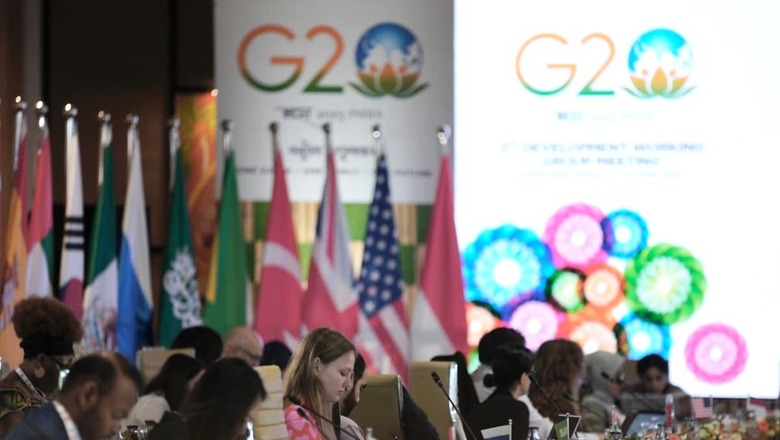
views
India has taken its G20 presidency with a tremendous sense of responsibility and with the aim of changing the destiny of its member nations. The activities being undertaken from this platform are unparalleled by all standards. The whole world is acknowledging it. India has also started its presidency with the theme of “One Earth, One Family, One Future,” which in the process is rekindling hope for all, especially when the world has suffered the Covid pandemic and is still undergoing multiple effects of conflicts, global warming and the like. The theme selected goes with the Indian custom of ‘Vasudhaiva Kutumbakam.’
India is planning to host more than 200 events as part of its G20 presidency. The events have been spread in more than 50 cities in the country, including the state of Jammu and Kashmir, which is now under the governor’s rule post abrogation of Article 370. This approach of spreading the events in multiple geographies of the nation is the most common approach of the current regime wherein major national as well as international events are hosted all over the country. Not only this, even the heads of the states have been hosted in different states. While some may object to this but these events definitely help to showcase the diversity of India to the world. People also get benefitted as focused development is undertaken in these areas and art, culture & commercial products of various regions get an opportunity to make a mark on the world stage.
As part of this established practice, India has chosen the beautiful city of Srinagar in J&K for hosting the G20 Tourism Working Group Meeting from 22-24 May, 2023. It is also hoped that the visitors will be able to see the rich cultural heritage of J&K as well as the potential of tourism in India. The beautiful ambience will assist in generating positive ideas related to ‘tourism’ wherein it can ease the travelling of all human beings the world over. These activities can then generate substantial economic activity to enhance growth in the world economies, which are under serious stress at the moment.
While it is more apt to discuss the important issues facing the world in the current times through the forum of G20, Pakistan has again raised its objections to holding this event in Srinagar. This objection is being raised at a time when Pakistan is undergoing one of the most serious economic crises in the country. The people are not able to meet their basic needs and deaths are taking place due to stampedes caused by ‘flour distribution’. Pakistan should focus on its economy rather than following up its regular stereotyped stance towards J&K after more than 75 years of its accession to India when the nation itself is still occupying close to one-third territory without any justification.
However, the focus of this article is a little different. It focuses on how this G20 event in J&K can be leveraged by both India and Pakistan to commence dialogue to resolve their mutual issues.
Pakistan was and continues to be obsessed with J&K. It fought four wars with India besides clashes related to the occupation of Siachen Glacier. There were some ‘on’ and ‘off’ hopes for reconciliation but these did not last long. Even when Imran Khan came to power, initial hopes were generated that the relations may improve but he also reversed his thoughts and took refuge in the conventional approach of Pakistan which has been anti-India. The narrative was charged in August 2019 when India took a historic step to abrogate Article 370 in the state of J&K besides the creation of the Union Territory of Ladakh. The narrative of Pakistan for J&K became more theoretical and the world did not react as per Pakistan’s wishes. The change was as per due constitutional process. It is a separate issue that the case is pending in the Supreme Court of India for adjudication and it is hoped that the court will take appropriate decisions as per its wisdom and interpretation of the Constitution on the issue. What has now been the leftover narrative of Pakistan is the fact that they are demanding the restoration of Article 370 for the dialogue process to commence. This major change in the narrative of Pakistan, from coming down to the UN-led plebiscite to merely the restoration of Article 370, is something which has to be taken note of. The recent downward economic turn in Pakistan has led people of PoK, Gilgit and Baltistan as well as the rest of Pakistan to voice their thoughts regarding the possibility of their lives being better had they continued with India.
Be that as it may, the G20 event being planned in Srinagar in May is a golden opportunity both for India and Pakistan to benefit from its positive spin-offs. It is more relevant to tourism. It can be leveraged for national advantage by both India and Pakistan as under:
India
- While India has had a legitimate claim on the entire state of J&K since accession in October 1947, it still looks for the continued support of other important nations to beat back the Pakistani agenda. The current Indian presidency of G20 gives a positive opportunity to India to host a large number of countries to visit Srinagar. They will be able to see for themselves the normalised security situation wherein a lot of tourists are moving freely in the state and the life of everyone is absolutely ‘normal’. ‘Seeing is believing’ – an adage which will play itself out in May.
- Tourism’ is the most important activity in the state of J&K. Even after the Covid pandemic era, it provides close to 10 percent of the state’s GDP and more than 50 percent of population is involved, directly or indirectly, in tourism-related activities. Tourism will get more boost after the G20 event. The best part is that this event has been slotted in May which is part of peak tourist season.
- There are many more advantages which will come to the Indian establishment after this event. It is more important as to how Pakistan has the opportunity to see the positive side of this event to commence the stalled dialogue process with India.
Pakistan
- Any positive development in J&K is always presumed as a negative development for Pakistan, a mindset which needs to change. While the abrogation of Article 370 has already marginalised the Pak agenda, they now need to look at a ‘positive’ way of handling their national interests.
- Pakistan is losing its well-wishers in the world due to its role in Afghanistan as well as its current internal state. Supporting (or not criticising so to say) G20 in Srinagar may be showcased more advantageous as they can argue this being a support for the benefit of J&K residents. It is equally important that they don’t initiate and precipitate terrorist activities which recently happened in Poonch resulting in the death of five Indian soldiers.
- As far as abrogation/restoration of Article 370 is concerned, having made this an issue for peaceful dialogue, it can always base its approach as and when Indian Supreme Court pronounces its judgement as the Indian judiciary at the apex level commands the highest respect, both within the country and abroad.
- Fully knowing that there are far more serious border/LAC conflict issues between India and China, direct trade is still continuing at alarming levels despite the trade deficit not being in favour of India. India is probably continuing this trade relationship as there are distinct economical advantages and needs of the people that have to be addressed. The trade can be downgraded once self-reliant India is ready with its own supply chain robust mechanism. Pakistan has to realise this and on the occasion of the G20 event in Srinagar, it may show courage to commence direct trade with India to address the suffering of its people.
- The positive ecosystem generated can address our majority issues for the larger benefit of the people of both countries.
Historical and complex situations demand statesmanship on the part of all the stakeholders. India and Pakistan are no exception. People of the same flock need to shed their adversarial relations and come together for the larger good of the nation. The G20 event in May could provide an excuse for both to rekindle their relationship in the positive domain. Hope someone listens.
The writer is a retired Army veteran. Views expressed are personal.
Read all the Latest Opinions here

















Comments
0 comment